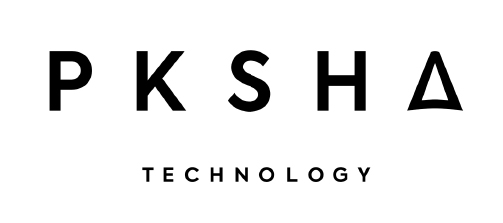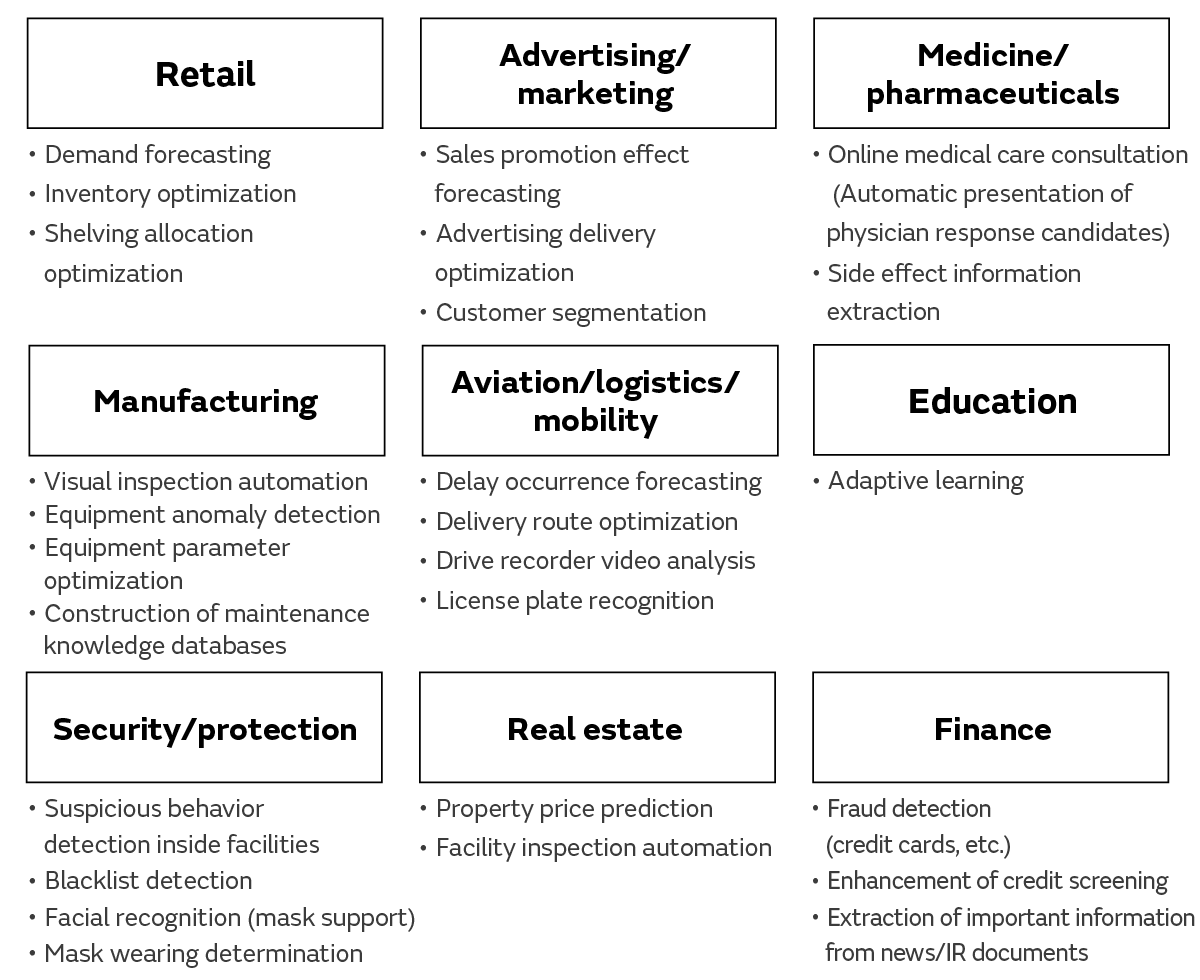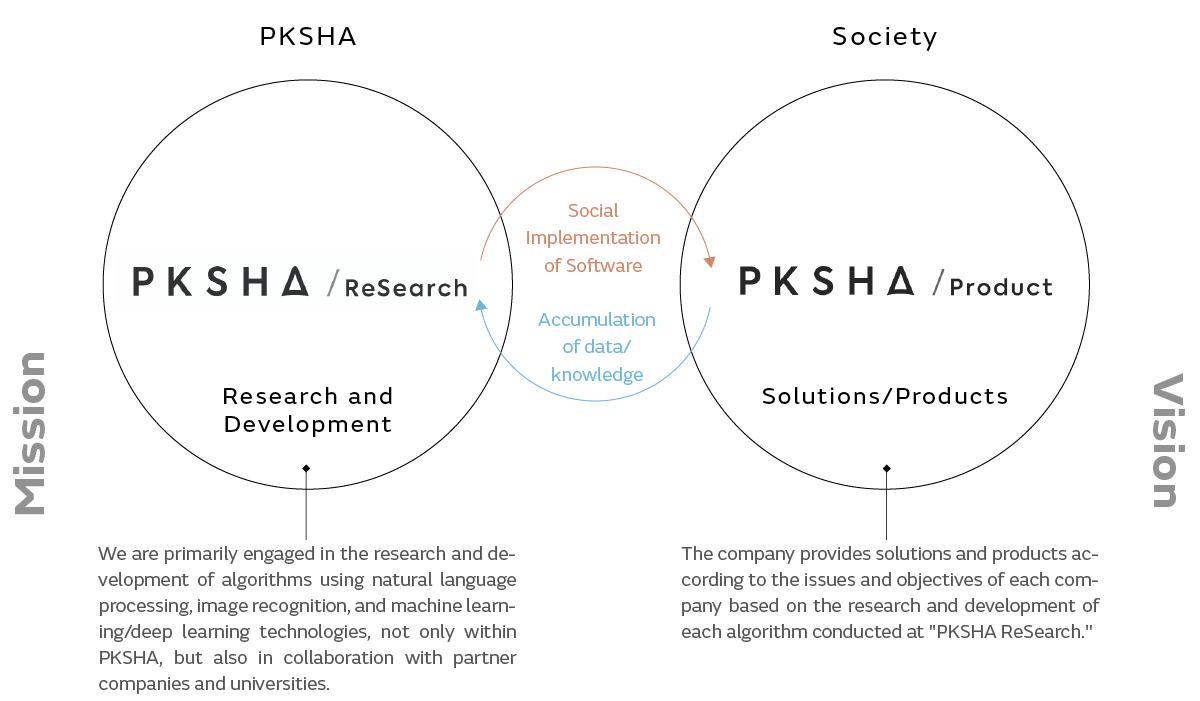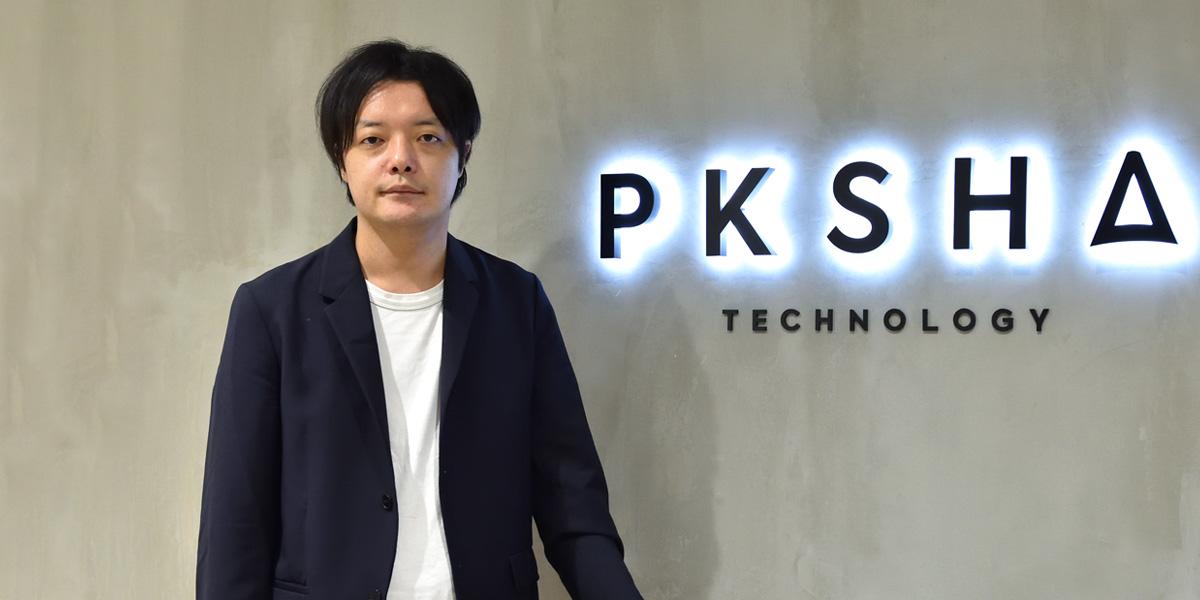Open Innovation × PKSHA
Expanding the Impact of AI Utilization to More Fields Through the "Co-evolution" of Research and Development and Social Implementation
The application of artificial intelligence (AI) has steadily spread.
AI is even being used in unexpected services of various fields such as retail, advertising, medicine, education, and finance.
For the very reason that these fields were previously disconnected from digital technologies, it appears that the utilization of AI is spreading. PKSHA Technology is a company that has greatly contributed to the expansion of AI application in Japan. The company has accelerated the expansion of effective AI application through the interlinking of AI algorithm research and development and the social implementation of solutions and products that apply those algorithms. Currently, the company is working on open innovation through links with different fields and tackling the challenges of AI technology evolution and the expansion of social implementation.
We spoke with the company's Representative Director Katsuya Uenoyama about AI utilization and the front lines of its application expansion. The first part of this series introduces the key points of blazing a trail of AI application in various fields.
The utilization of machine learning, deep learning, and other information processing technologies related to so-called artificial intelligence (AI) is steadily progressing.
In 2012, the recognition rate of image recognition dramatically improved through the utilization of deep learning, and in 2015 it finally became able to achieve a high level of performance that exceeds the recognition capabilities of humans. AI has triggered a boom that can be called a social phenomenon.
In machine learning and deep learning, computers train on a massive volume of data to search for trends lurking in the data that are invisible to human senses and enable highly accurate inferences. It can be described as an "alien" intelligence in contrast to the approach of conventional information processing technologies that use programs with clear rules for the processing procedures.
Social Implementation of Machine Learning-Based AI Steadily Progressing
Compared to the situation during the boom when it was argued that many people would lose their jobs to AI and every company was thinking about applying AI to their own business, currently it feels as if the topic of AI has considerably quieted down.
However, the applications that cannot be realized unless they are AI based on machine learning or deep learning (hereinafter, "AI") have become clear, and it may be considered that we have transitioned to the phase in which social implementation will steadily proceed.
AI that is a form of information processing technology that differs from the past holds the potential to solve issues that could not be addressed by previous technologies.
Therefore, it is also producing new forms of value in fields of business where the application of previous information processing technologies had not progressed. Many companies from startups to major corporations are discovering business opportunities in such untouched potential and working on the development of devices and the creation of services that apply AI.
Meanwhile, there is a Japanese startup that has continued to lead the research and development and social implementation of AI technologies in Japan from before the AI boom started until the present day. That startup is PKSHA Technology (hereinafter, "PKSHA"). Since being founded as a startup called AppReSearch out of the University of Tokyo in 2012, it has continued to develop data analysis applications that effectively utilize AI.
PKSHA has helped to create value and solve the issues faced by companies in a variety of industry segments and sectors.
PKSHA is a company that has displayed its strengths in the R&D and social implementation of algorithms concerning natural language processing, image recognition, and machine learning/deep learning. Thus far, the company has introduced the 165 AI algorithms that it has researched and developed into software and operations operated by more than 2,200 companies. It is said that through the services operated by each of these companies, the company's algorithms are used by more than 9.3 million users every day.

[PKSHA Technology Inc.]
Under the mission of "Shaping Future Software," PKSHA Technology provides AI SaaS and develops AI solutions using machine learning and deep learning algorithms developed in-house to create future relationships between companies and customers. In addition to providing solutions according to customer issues based on a wide range of technologies including automatic answering using natural language processing technologies, image/video recognition, and prediction models, the company supports the promotion of Japanese DX in a multifaceted manner through the deployment of AI SaaS that solves common issues with the goal of realizing a prosperous society in which people and software evolve together.
Expanding the Application of Highly Competitive Technologies Produced Through Collaboration With Customers to Many Fields
Currently, if asked for a representative field of AI application, many people would probably think of self-driving technologies, etc. in the automotive field. However, the application of AI is spreading to fields that are surprisingly familiar. For example, according to Representative Director Katsuya Uenoyama, the company is "providing solutions and products effectively utilizing AI to various industries and sectors such as finance, retail, medicine/pharmaceuticals, and manufacturing." (Figure 1)

At PKSHA, they research and develop algorithm modules in multiple areas and utilize them as component technologies that make up solutions and products aimed at various use cases.
The "voice recognition and voice synthesis module" understands the content of human speech and communicates to people in a natural synthesized voice. Moreover, the "natural language processing module" understands information communicated through spoken language and extracts, organizes, interprets, searches, converts, responds to, and generates valuable information from the content.
The "moving image recognition and moving image synthesis module" recognizes people, things, and backgrounds from images and videos to interpret and synthesize the content. Next, the "prediction/inference/optimization module" extracts the trends inherent in data that are difficult for people to notice and performs the appropriate decision-making.
However, PKSHA mentions that you cannot deploy highly competitive businesses just by possessing such component technologies. "It is truly important to tie the component technologies to needs faced by society and create valuable services." (Uenoyama)
Moreover, PKSHA has reportedly developed solutions to meet various needs while collaborating with customer companies. The applications cover a wide range including the optimization of product pricing based on the forecasted retail store demand, automatic recognition of vehicles using parking lot and other locations, detection of unauthorized credit card use, optimization of the shelving allocation of product displays at retail stores, and learning apps that optimize problems according to the level of understanding and topics that tend to be weak points. All of those applications automate tasks that previously would have been performed by an expert with extensive experience.
In addition, the company also developed a "product (AI SaaS)" as a standard service that can be applied to many applications and is provided as a cloud service. Representative products include a chatbot feature that can easily introduce a chat style interactive engine just by embedding a few lines of tags in a website, a voice bot feature that completes regular inquiries that come into a call center with an automatic voice interaction, and a feature that achieves everything from FAQ (frequently asked questions and responses) creation, publishing, and evaluation to response management in a one-stop fashion.
Software Research and Development and the "Co-evolution" of Human Activities Through Their Social Implementation
According to Uenoyama, because there were almost no companies conducting business to support the social implementation of AI at the time when PKSHA was initially founded, such services were in great demand. However, the company later continued to grow even as the number of competitors rapidly increased. What was the reason for PKSHA's ability to lead the AI social implementation business from the time it began up to the present?
Uenoyama explained, "At PKSHA, we have adopted our own unique business approach of 'co-evolution' that simultaneously promotes the research and development of AI algorithms and the social implementation of solutions and products that apply the R&D results." (Figure 2)

In the general manufacturing industry, companies possess proprietary technologies developed in-house, develop applied products that utilize those strengths, and provide such products to customers who require them. By contrast, sustainably growing an AI business "requires a business structure that can continuously gather the live data from society that is essential to developing solutions and products that meet society's needs to nurture AI." (Uenoyama)
Moreover, the company is applying the knowledge obtained through the process to produce solutions aimed at solving individual issues as well as the know-how and data accumulated through product usage to further deepen future technology research and development. Uenoyama explains, "Our interactive engine that uses natural language is being used to automate the contact center of a social media provider that boasts a massive number of users. Moreover, the engine is being used by many companies in addition to this customer. As a result, it has become the largest-scale collection of accumulated voice data in Japan." The secret of the company's strengths may be found in such strong, close ties with customers as well as the creation of a virtuous cycle of R&D and social implementation based on those relationships.

PKSHA Technology Representative Director Katsuya Uenoyama
After primarily focusing on work relating to the Internet industry/software industry as a new graduate at the Tokyo and Seoul offices of Boston Consulting Group, Uenoyama participated in the launch of the Silicon Valley, US office of GREE International where he was involved in large-scale log analysis work for Web products. After earning a PhD (machine learning) at the Matsuo Lab (The University of Tokyo), he was appointed as a Laboratory Assistant Professor. In 2012, he founded PKSHA Technology in parallel. He is a member of the Cabinet Secretariat Digital Market Competition Council Working Group, and a committee member of the METI Expert Group on How AI Principles Should be Implemented. In 2020, he was selected as a member of the "Young Global Leaders YGL2020" by the World Economic Forum (Davos Forum).
Research Approach Based on Collaboration That Exceeds the Boundaries of Organizations and Fields
Uenoyama explains, "In the software area, even if something is the latest highly competitive technology at the current time, for example, it is immediately made into an open architecture and becomes a commonplace technology. Therefore, there is a need to continuously create technological innovation."
The fact that the company's research and development approach is unique appears to be a factor that is strengthening PKSHA's AI business.
In order to maintain the market value of cutting-edge information technologies and to socially implement research results as soon as possible, the company actively collaborates with partner companies and universities working in various fields and strives to constantly incorporate new knowledge that spans the boundaries of organizations and specialties to integrate it into their own technologies. "In particular, we emphasize collaborations with companies that manage social infrastructure. The reason is that if our algorithms can be introduced into such companies, the effect is leveraged, and we can have a major impact on society. In addition, we can also acquire a large volume of data that is essential to research."
Moreover, the importance of weaving together technologies from multiple fields to create new fields has been increasing within the research and development of every technology field in recent years. Therefore, it will become important to discover new knowledge working in the "boundaries between different fields" and create new forms of value. Regarding this point, we will dig into it in more detail in Part 2.
In addition, Uenoyama also explains that in order to implement information technologies in the real world and obtain the desired effect, "the ability to actually run the created solution or product in the real world as soon as possible, quickly run a feedback loop, and customize or brush up the solution or product becomes important."
Because of this, PKSHA emphasizes "practical research," which tries something out and then deepens the concept.
PKSHA Will Not Accept Orders for Development Projects Where Customers Cannot Recover Their Investment
PKSHA is said to have many customers who continuously bring in projects.
Moreover, there are also many examples of customers introducing other customers.
Uenoyama explains, "We treat customer success as something that is very important. When we examine the details of projects that customers ask us to look at, maybe 30% of them actually have the potential to achieve effective results by applying AI.
In many cases, you might be able to realize automation or labor-saving if a huge amount of money is invested, but in most cases it would be challenging to recover that investment.
Most customers are thinking about introducing AI with the goal of achieving some sort of efficiency or value improvement. Even if you recklessly proceed with the development in such a case and were to realize the goal, you cannot achieve customer success. From an engineer's perspective, at the stage when we are approached, we determine if what the customer is seeking can be achieved and emphasize essential problem-solving."
The reason PKSHA has earned the trust of many customers within the intense ups and downs of the AI business is perhaps that they thoroughly pursue customer success and are able to provide solutions and products that demonstrated the expected results. In Part 2, we introduce the significance and value of the open innovation as conceived by PKSHA.

